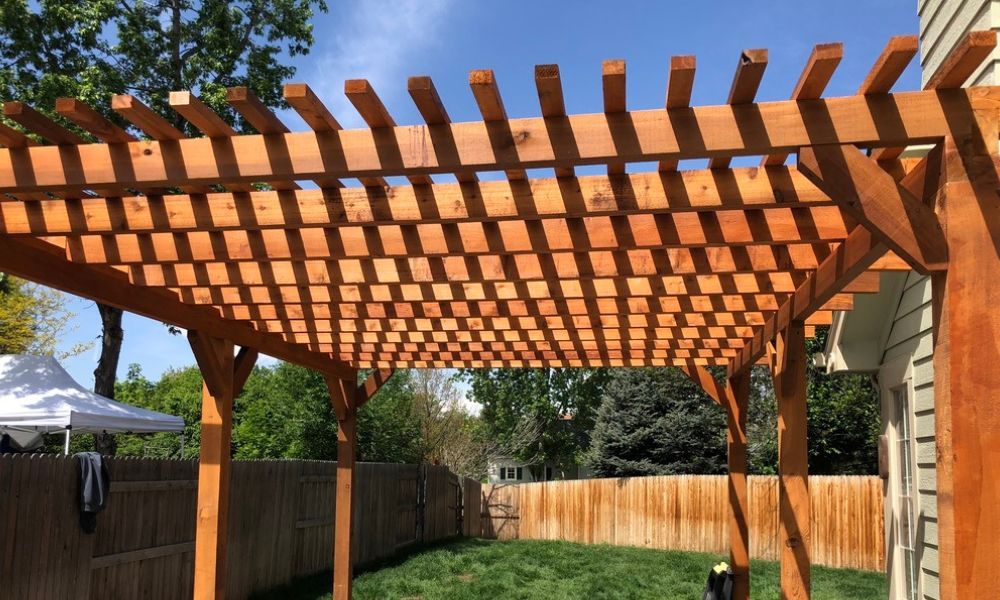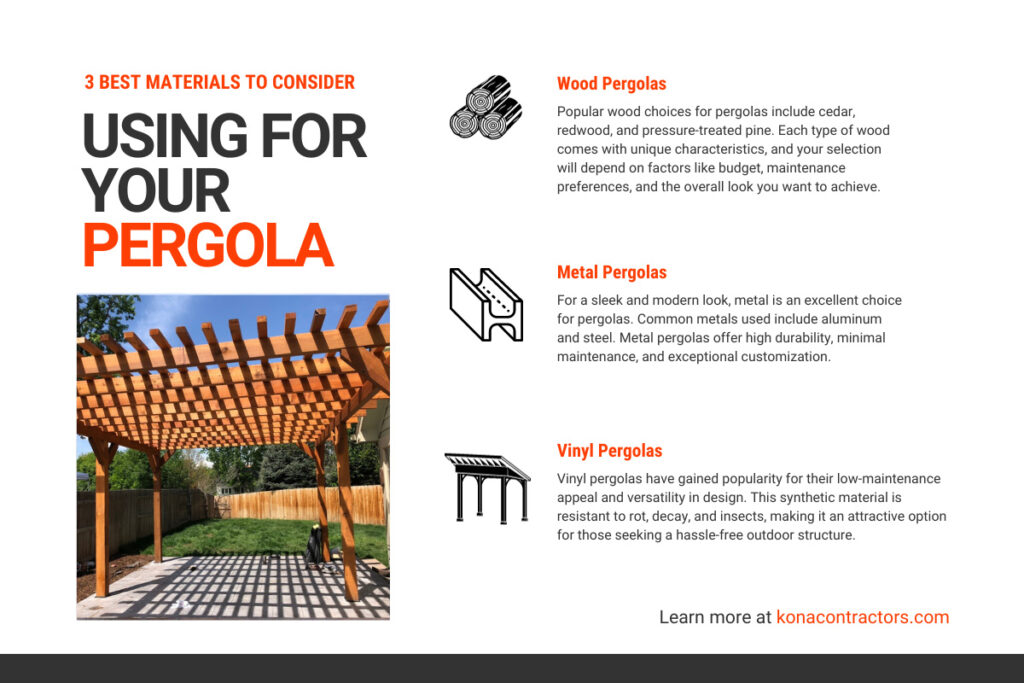
3 Best Materials To Consider Using for Your Pergola
A pergola is more than just an outdoor garden structure; it’s a statement of style and a functional addition to your living space. Whether you decide to create a cozy retreat in your backyard or enhance your landscaping aesthetics, choosing the best design and resources for your pergola is crucial. Before planning your project, review the three best materials to consider using for your pergola.
Wood Pergolas
Wood is the quintessential material for pergolas, loved for its timelessness and natural beauty. Popular wood choices for pergolas include cedar, redwood, and pressure-treated pine. Each type of wood comes with unique characteristics, and your selection will depend on factors like budget, maintenance preferences, and the overall look you want to achieve.
Wood Pergola Materials
- Cedar: Known for its natural resistance to decay and insects, cedar is a top pergola choice. Its warm, reddish-brown hues add a touch of rustic charm to outdoor spaces, and cedar is lightweight, making it easier to work with during construction.
- Redwood: With its rich, reddish-brown color and resistance to decay, redwood is another excellent option. It emits natural oils that act as a barrier against insects and rot. Redwood’s durability makes it a long-lasting material, although it may come at a higher price.
- Pressure-treated pine: This material is a cost-effective option that offers good durability. Pressure-treated pine is infused with chemicals to resist decay and insects. While it may not have the natural beauty of cedar or redwood, it can be stained or painted to achieve the desired aesthetic.
Pros of Wood Pergolas
Natural Elegance
Wood exudes a natural warmth and elegance, making it a popular choice for traditional and rustic designs. The earth tones of cedar, redwood, and pressure-treated pine can seamlessly integrate into an array of outdoor settings.
Customization
Wood allows for the inclusion of intricate designs and can be easily customized to suit your aesthetic preferences. Whether you envision a classic pergola or a more detailed structure, wood provides the flexibility to bring your vision to life.
Environmentally Friendly
Unlike synthetic materials, wood is a renewable resource. Choosing sustainably sourced wood options can contribute to an eco-friendly project.
Cons of Wood Pergolas
Maintenance
Wood requires regular maintenance to preserve its beauty and longevity. Periodic staining or sealing is necessary to protect the structure against the elements, and routine checks for insects or rot are essential.
Shorter Lifespan
Due to its susceptibility to the elements, a wood pergola has a shorter lifespan than other materials. While proper care and maintenance can help extend its strength and durability, you will likely get about 10–12 years of use out of this structure.
Metal Pergolas
For a sleek and modern look, metal is an excellent choice for pergolas. Common metals used include aluminum and steel. Metal pergolas offer high durability, minimal maintenance, and exceptional customization.
Metal Pergola Materials
- Aluminum: Lightweight and resistant to rust and corrosion, aluminum is ideal for low-maintenance pergolas. This material is available in various colors and finishes, so you can customize it to match your outdoor decor.
- Steel: Known for its strength and durability, steel is a robust material for pergolas. It can be powder-coated for added protection against rust and comes in various designs. Steel is heavier than aluminum, but it provides a solid and long-lasting structure.
Pros of Metal Pergolas
Modern Design
Metal pergolas are known for their sleek, modern designs that create an aura of luxury. You can enhance and embellish your backyard by building a steel or aluminum structure.
Easy To Care For
When it comes to cleaning and maintaining your pergola, metal makes the process easy. You can simply power wash or scrub the structure to keep it looking fresh and updated.
Best for Louvered Roofs
While other materials can support louvered roofs, metal pergolas are best for this important feature. Louvered, or mechanical, roofs allow for adjustable shades on your structure, which can be changed based on varying weather conditions and available sunlight. Metal pergolas seamlessly integrate this exciting customization.
Cons of Metal Pergolas
Cost
Metal is a more expensive material than wood or vinyl. However, due to its durability and strength, it is a worthwhile investment, with its lifespan offsetting the cost of the pergola and installation.
Weight
Weight is an important factor to consider with metal pergolas. Aluminum is light and must be anchored down, while steel is heavy and tough. Think about your needs and what you want to do with your backyard; this can make all the difference when selecting a metal material.
Vinyl Pergolas
Vinyl pergolas have gained popularity for their low-maintenance appeal and versatility in design. This synthetic material is resistant to rot, decay, and insects, making it an attractive option for those seeking a hassle-free outdoor structure.
Pros of Vinyl Pergolas
Durability
Vinyl pergolas can withstand the elements, making them a durable choice for various climates. They’re also known for their long lifespan since they won’t warp, crack, or fade over time.
Low Maintenance
One of the main advantages of vinyl is its low-maintenance nature. Unlike wood, vinyl doesn’t require new painting or staining. Simply washing it with mild soap can keep it looking fresh and new.
Design Options
Vinyl can be molded into various shapes and sizes, allowing for many different design possibilities. Whether you prefer a classic pergola or a more modern and sleek structure, you can customize vinyl to suit your style.
Cons of Vinyl Pergolas
Aesthetics
While versatile, some homeowners may find that vinyl lacks wood’s natural warmth and metal’s modern sleekness. It may not be the ideal choice for those seeking a streamlined or rustic look.
It Cannot Be Repainted
Once you’ve selected your color, vinyl pergolas cannot be repainted. If you decide you want to change the color, you must replace the entire structure.
In your quest for the perfect outdoor structure, consider these three materials for your pergola. Each option offers a unique set of advantages, so when planning your design, take into account your budget, maintenance preferences, and the overall aesthetic you wish to achieve.
As you embark on your project, consult local pergola builders who can provide valuable insights and ensure your vision is brought to life seamlessly. If you’re ready to transform your outdoor space with a stunning pergola, contact Kona Contractors today for expert guidance and impeccable craftsmanship. Let us turn your pergola dreams into a reality.

